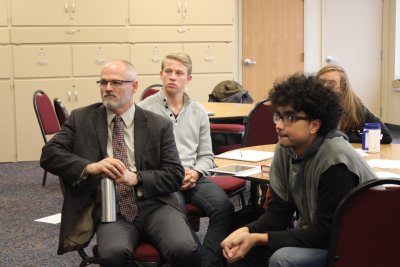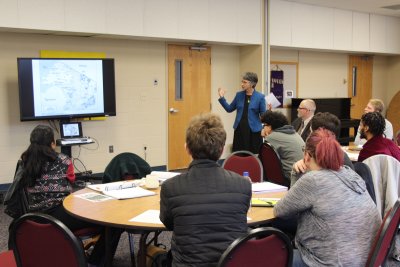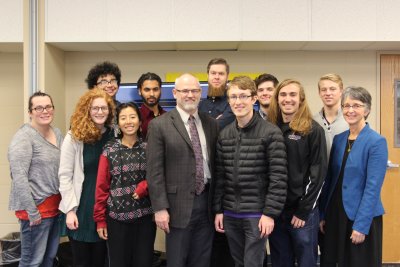Dr. Tobin Miller-Shearer Leads Oral History Workshop



On January 16, 2017, Dr. Tobin Miller-Shearer, Director of the African-American Studies Program at University of Montana and an Associate Professor of History visited Goshen College to lead an Oral History Workshop for students interested in the art of oral history and its methodology. He conducts research into the history of race and religion in the United States with a particular emphasis on prayer, the civil rights movement, and white identity.
Ten students, with majors varying from Peace Conflict and Justice Studies, History, and Education, were invited to attend the session where they could practice the basics of conducting an oral interview.
Miller-Shearer opened the session by emphasising the importance of oral history. “You are in the process of documenting changes happening over time,” Shearer said. The workshop participants created a list of its significance. It is a narrative and a democratisation of history; it gives validity to different cultures’ way of collecting information, and collects experiences.
As Miller Shearer explained the theory of oral history, he also included personal anecdotes of his experiences conducting interviews. In a raconteur manner, he shared “The Woman Who Didn’t Trust,” an experience that Miller-Shearer used to explain the necessity of asking the right questions and making the subject of the interview feel comfortable.
History professor Jan Bender-Shetler also shared her insight in her presentation of her experience conducting oral history interviews in Tanzania. After the morning session, Professor Regina Shands-Stoltzfus gave a presentation in context of African American Mennonite churches. The second part of the workshop focused on collecting stories from members of the Minority Ministries Council and recognising their work in the Mennonite church.
Brodie Nofziger (’18), a junior history and education major who attended the sessions, reflected on his experience. “I didn’t know quite what to expect, but my knowledge of oral interviews was really broadened. It was evident to me that it is more than sitting and asking questions, but using a variety of different methods to get the most information in the most effective ways possible,” Nofziger said.
“To be quite honest this all was pretty new to me. I, for sure, was able to see its importance. Many times people don’t have either the resources or the connections to share their important stories, and through oral history, a lot can be shared that is not in the textbooks or accessible on the Internet.”
Laura Miller (’17), a senior history major, shares a similar response and agrees with Dr. Miller-Shearer that oral history is an intense experience, drawing out stories by helping and guiding the interviewee. “We learned that oral history not only gives people unique insight into people’s experiences of the past, validates different cultural forms of communicating, and gives necessary perspectives of subjectivity, but it most importantly lets people know that what they did during their life is important and worth recording,” she explained.
Miller also added her insight to the importance of oral history and said, “I think that oral history is potentially one of the most challenging but life-giving and relationship-building aspects of history work. It needs to be done properly and with care so that respect is given to people and their stories, and this oral history workshop helped provide the tools to do that.
Along the lines of the oral history workshop and its continuation with the upcoming Minority Ministries project, Miller noted the importance of collecting stories, so that their action and work for racial justice in the Mennonite church can be remembered.
“The continued work for social justice in the Mennonite church is aided the more we are connected to it’s history,” Miller said.




